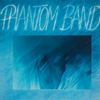Phantom Band
 Featuring Can’s Jaki Liebezeit on drums along with Helmut Zerlett and Dominik von Senger amongst others, on Phantom Band’s eponymous debut they try to bring the new musical frontier of '70s Germany into the then sprightly '80s with varying degrees of success. This mixed bag of krautrock-cum-world music lacks the punch of their Freedom of Speech album but acts as a fitting introduction to the group’s brief career.
Featuring Can’s Jaki Liebezeit on drums along with Helmut Zerlett and Dominik von Senger amongst others, on Phantom Band’s eponymous debut they try to bring the new musical frontier of '70s Germany into the then sprightly '80s with varying degrees of success. This mixed bag of krautrock-cum-world music lacks the punch of their Freedom of Speech album but acts as a fitting introduction to the group’s brief career.
Liebezeit’s fondness for Jamaican-inspired rhythms and instrumentation are apparent from the offset with "You Inspired Me," which sits somewhere between Westernized exotica, saccharine lounge jazz and a krautrock drift. The end result is not as unpleasant as the previous sentence reads; despite it sounding dated, the band play with enough feeling to not upset the music. The same can be said of most of the album, although occasionally the Phantom Band dip into some cheesy self-indulgence such as some of the guitar playing on "I am the One" or "Rolling." Even within the most cringe-worthy moments, there is still something worth latching on to. In the aforementioned "I am the One," von Senger unleashes a beautiful guitar solo just over halfway through that is worth any amount of unnecessary noodling.
Liebezeit’s brief moment to shine occurs on "Phantom Drums," a dizzying array of overdubbed percussion which takes in as many unusual and unique sounding percussive instruments in its brief existence as possible. This leads into the album’s zenith, "Absolutely Straight," which sees all of the Phantom Band lock into a serious, meaty groove. The bouncing bass line of Rosko Gee anchors the soaring guitars to the unearthly pulse of Liebezeit’s drums. The same levels of excitement are captured in the dying moments of the album with "Pulsar" which sounds the most like what modern ears would consider krautrock but with a more fashionable production for the time.
Overall, this album is enjoyable but sounds very much of its time from the production down to the instrumentation (particularly on pieces like "Without Desire," which is almost painfully outmoded). This is not necessarily a bad thing but I must admit I find it a little too '80s for my tastes. At times I feel like I am listening to a recording for a particularly adventurous set of session musicians who have been given some studio time in exchange for playing Phil Collins' backup band. However, knowing that the fantastic Freedom of Speech was also created by the same players reveals this album to be a dress rehearsal for the real performance.
samples:
 




